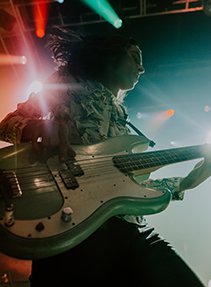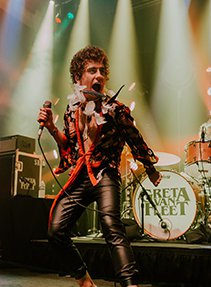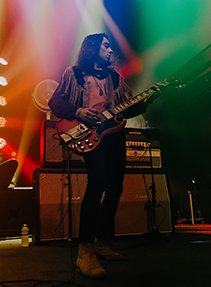By Cate Reynolds
Photography by Laura Nicaise
Long before the doors opened at D.C.’s 9:30 Club on July 20th, crowds of people lined V Street NW stretching a block down to 8th Street NW and around the corner. It was difficult to pinpoint any commonalities within the diverse group, and the age demographic was wide-ranging. It seemed the only thing these people had in common was Greta Van Fleet

So who is Greta Van Fleet? In a nutshell, four guys from Michigan who really dig old American music and happen to be extremely talented musicians themselves. What started as a fascination with their parents’ vinyl collection blossomed into a strong love for music, and a desire to create and inspire others through music of their own. Lead singer Josh Kiszka is joined by his twin brother Jake Kiszka on guitar, younger brother Sam Kiszka on bass, and longtime family friend Danny Wagner on drums.
And it’s no wonder why Greta Van Fleet has gained such a diverse fan base. Their sound is wildly reminiscent of the golden-age of classic rock peppered with old school blues influence—attracting an older fan base. But, with the eldest members clocking in at just 22-years-old, Greta Van Fleet is giving younger audiences contemporary music unlike anything else out there right now, and perhaps unlike anything they’ve ever heard before.
The sold-out crowd at 9:30 Club had the feel of a family reunion. “There’s not a single band out there who is accomplishing this,” one man commented. “I mean, look at all these people, all these different ages and backgrounds. It’s like a party.” Generations of music fans are merging together to witness the rock and roll renaissance fueled by Greta Van Fleet.

At exactly 10:15 p.m., the lights of the 9:30 Club lowered and the crowd roared as lead singer Josh Kiska, donning leather pants and a floral kimono, led the band on stage while tossing long-stem white roses into the crowd. The show opened with “Highway Tune,” the band’s debut single on their first EP Black Smoke Rising. The song topped Billboard’s Mainstream Rock and Active Rock charts in September 2017, and drew comparisons to early Led Zeppelin, especially in regards to Josh Kiszka’s Robert Plant-esque vocal range.
“Highway Tune” was followed by “Edge of Darkness,” which featured a fierce guitar solo by Jake Kiszka, and “When The Curtain Falls,” the band’s newest single, which they released earlier in the week. The set continued with several original songs, and a cover of both Howlin’ Wolf’s “Evil” and Arthur “Big Boy” Crudup’s “That’s All Right.”

The crowd’s energy was unwavering, which was likely a result of the unbelievable amount of passion and vivacity Greta Van Fleet put into every single song they performed. Their adoration for music and devotion to their fans is apparent by the reverent, almost spiritual way in which they perform. Their connection to their music is unique, and unlike any live performance I’ve encountered. Each note sung and each chord strummed was executed with honest emotion, leaving the audience aching for more.
So, when can fans expect new music from Greta Van Fleet? According to guitarist Jake Kiszka, the new-album is set to release in October.
Check out my full interview with Jake to get the whole scoop:
Cate Reynolds: So how did you initially become interested in music and begin playing, and how did Greta Van Fleet come together?
Jake Kiszka: I think a large part of our initial influence was our first introduction to music, which was really early on. We grew up in a very creative and nurturing environment. And it wasn’t just music, it was a lot of literature, photography, and pretty much whatever we could get our hands on at that point.
We grew up around quite a large collection of vinyl that our parents had collected, and that was something we played with really early on, even before we were really listening to the records. We would just play with the vinyl and try to get it to work on the record player. So eventually, we started listening to what was on the records and it was a lot of early American music, a lot of blues to begin with, guys like Ellmore James, Howlin’ Wolf, Muddy Waters, Robert Johnson, B.B. King, John Lee Hooker. Then there were a lot of folk records laying around, and again that was a lot of really early American music too like Arlo Guthrie, and then we got into Bur Ives, John Denver, Joni Mitchell, Bob Dylan, Mamas & The Papas, and it went on from there. We started listening to R&B, a lot of Aretha Franklin and all of those R&B singers, so that was really our early introduction to music. And I think those early influences have definitely stuck with us in terms of what our listening preferences are.
I began playing guitar probably around three years old, my father played guitar, and it was kind of something I picked up early on. And as far as Josh’s singing, that was pretty initial too. We would sing in the car together, and singing was just something he always did. It was pretty apparent even then that he was just a lead singer. He was singing all the time. And I think it was around early high school that I met a drummer who had just joined jazz band, and during that particular time I was involved in jazz band, so I started inviting him over after school and we began jamming in the garage, me on guitar and him on drums. And then he started pulling Josh out because we needed a singer, and he came out on his own eventually and start playing with us. The family would get home from school and it would be a pretty ritualistic routine for us to come home, grab something to eat, and then zip off to the garage and never be seen again. And then eventually we needed a bass player, so we’d say [to Sam] “hey come out and play with us” and he’d be like “yeah sure, I guess.” Eventually he started coming out more often on his own accord, or you know, we’d beat him up or something (laughs).
Yeah, so that was the early formation of it. And it wasn’t long after that we brought Danny on board to play drums, and that was kind of it. At the point we knew that we had something pretty special.
CR: What do you think it is about that early American music and early blues music, which obviously has influenced your own music, that resonates with you guys so much? What do you love about that era of music?
JK: I think that there is a very well-defined emotion and truth about [that music]. Before you could manufacture [music] that wasn’t necessarily as pure or organic in the way that it was done, the only way to do it was to put full emotion and feeling into it. And I think the thing that always gets us with that is the purity of it. It’s unencumbered and it doesn’t lie to you, you know? You don’t feel like you’re being lied to when you’re listening to it. There’s a special spiritual element to it, and I think that is what really resonates with us.
CR: Greta Van Fleet’s sound is really different than the majority of newer music out there, even in terms of the rock genre and a lot of the rock music that is coming out now. Are you a fan of any contemporary music, or are you pretty true to the old-school stuff?
JK: Oh yeah, we listen to quite a few contemporary artists. There are a lot of artists that touch us musically. There’s good music out there, it’s just so difficult to find it. Fleet Foxes is a band we really enjoy, First Aid Kit, Grizzly Bear is another one, The Black Keys, some of Jack White’s stuff, Paleo. There’s quite a few, but off the top of my head that’s all I can muster.
CR: I don’t know if you’ve ever heard this before, but, some people say you sound a lot like Led Zeppelin.
JK: (Laughs) Really!? Wow.
CR: Do you ever get tired of hearing that? Or feel the comparison ever prevents people from appreciating the band and your sound as something unique?
JK: I suppose that there is a relative amount of concern in the sense that people may not see through something that was influential to us, or influenced our sound, and see the organic structure within the confines of what is naturally there. But no, that is something we never get tired of hearing. It never gets old. We’re really humbled by the reference and honored by the affiliation.
CR: Yeah, it’s a pretty big deal.
JK: Yeah, to be compared to one of the greatest rock bands of all time. I think it’s great.
CR: And by Robert Plant, too.
JK: Yeah, the torch bearer himself.
CR: This happened pretty fast for you guys. You’re selling out shows all over the country. Did you ever think this would happen and happen so fast? And how are you adapting to this sudden fame?
JK: No, I don’t think that any of us really predicted such an immediate response to what we’re doing. It’s interesting because I feel if we weren’t doing this since pretty much the day we were born, we wouldn’t be able to keep up with the demand of touring, and evolving, and playing shows. And I think the most important thing is that we grow and evolve. Before we were playing in front of maybe 10 or 15 people in a dive bar, and now we’re in front of more people than the population of our hometown. The difference is pretty vast. So no, none of us expected it to grow this quickly. It’s a very surprising and humbling thing to see people come out in droves to see us.
CR: Earlier this week you guys released your new single “When The Curtain Falls.”
JK: Yeah! What do you think? You like it?
CR: It’s awesome. I like it a lot.
JK: Yeah? Thanks.
CR: How do you think you have evolved since you were in the recording studio with your EP, and how does this song, and maybe some of your upcoming music, differ from the earlier stuff you put out?
JK: I think some of the rigorous touring that has taken place over the past year and a half was pretty influential as far as performance goes. The evolution and growth of performance, and even in terms of songwriting, the tour definitely influenced the material on the new album. Even as studio musicians we’ve come a bit further. And I think we’ve just been saying “alright, lets beat what we’ve already put out”, and it wasn’t a difficult thing to do. I think there’s also the element of maturity. Even with “When The Curtain Falls,” I think you can hear the improvement, and it’s sort of a different chapter of where we are, and showcases where we are now.
CR: When can we expect the new album?
JK: October.
CR: October! Nice. And what people expect from that album?
JK: It’s very similar to Black Smoke Rising and From The Fires in the sense that the material is collectively from three years ago and stuff that was written during the recording process. When we finally had the time to settle down for two weeks to do this, all this material that was just kind of in the air just came in that time, and these songs were coming to us left and right. So, we started putting together a bunch of stuff, and basically just writing a song and recording it in one single day. We basically had a fully functional base of tracks to work from. So, there’s stuff that was written a few years ago, and stuff that was written in the last two months. There’s also a very intimate way in which the tracks are laid out. There’s a dynamic of acoustic stuff and electric stuff, so that should be another interesting thing.
CR: Alright, we’re going to get a little deep here. What is your goal as a musician? Why do you love doing this, and hope your fans and listeners gain? What are you attempting to put out into the world?
JK: I think a lot of people do this for the wrong reasons. If you’re doing it for anything based around money, power, sex, or fame—all of that is pretty pointless. There’s no truth to any of the essence of what the purpose of music is for in any of that. I think because we’ve been doing this since we were very, very young, music found us before we found music. It’s something that is still very pure and natural to us. Being lucky enough to have musical abilities and being able to share that with the world, we’re lucky enough to project a lot of our messages through the music and put a lot of love and peace out there and try to unite people. You see all these people in the audience as one, and they’re coming to share in this experience, and it’s special to see that. We’re lucky to do what we do, and hopefully it does good for the people and the fans. It’s important to us that people are able to leave a show and take something from it, and take all this good energy and go back into the world and put it out there. There’s something important and magical about that, and I think that is something we’re all hoping to continue to do as musicians as long as we continue going, and continue writing, and continue putting out albums, and putting out music.